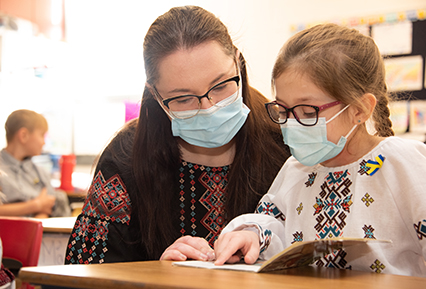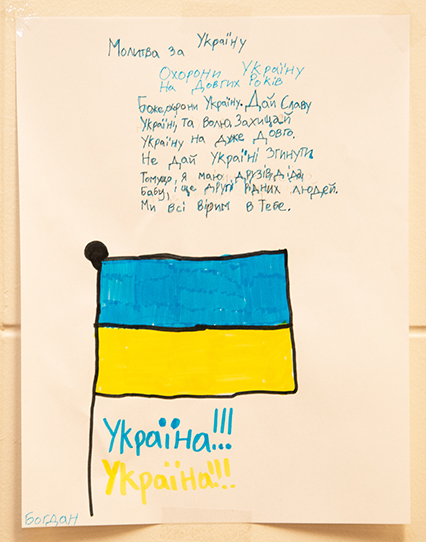Page Content
Support from colleagues helping with terror and uncertainties of war
As a Grade 3 teacher in Edmonton, Khrystyna Marenych never expected that conversations about war, death and conflict would be daily occurrences in her classroom, but that’s been the case since Feb. 24, when Russia invaded Ukraine, her homeland and that of most of her students.
“Students are asking these questions, we don’t have to prompt these conversations, and it’s not easy to find answers in a manner that students will understand,” Marenych says.
Marenych teaches at St. Martin Catholic School, a K–6 Ukrainian bilingual school where most students and staff members have ties to Ukraine.
“We’re constantly checking the news for updates on Ukraine, and checking in with one another to see how we’re doing mentally, emotionally,” Marenych said.
“People are sharing stories with each other about how their family members are doing and the news updates that they’ve heard, so the atmosphere is very solemn and serious in school, between the staff, but it’s also very hopeful.”
The day after the invasion, division personnel visited the school and held a special prayer. It helped.
“You could feel it in the whole school atmosphere that students and teachers were together and were in spirit with each other,” Marenych said.
During the first week of the war, a crisis management team visited each classroom and answered every question that students had.
“The atmosphere in the classroom during those conversations was very solemn as every student asked questions I never thought a child would ever have to ask, about war, about death, about families being separated, about bombing, combat,” Marenych said.
“We’re trying to keep it together for the kids and explain it as best we can, but these conversations are happening every day.”
The situation has been similar at A. L. Horton Elementary School in Vegreville, which is home to a Ukrainian bilingual program that includes about a quarter of the students. Some of the students and staff have family members in Ukraine.
“As staff, we try to be an ear for them and just kind of check in regularly. They look so tired,” said principal Keri Busenius. “It’s certainly very muted around here.”
Support for Ukrainian staff and students at both schools has come from a variety of sources throughout the province and in many forms, such as posters, fundraising campaigns, requests from non-Ukrainian teachers for Ukrainian songs and prayers that they can introduce to their students, and days of solidarity featuring blue and yellow, the colours of the Ukrainian flag.
“We’ve had such outpouring of support. It makes us feel so honoured and so supported,” Marenych said. “We could not imagine that we could get such love that we’ve been feeling lately.”
Hope remains strong
While the atmosphere in her school has been sombre, it’s also been tinged with hope, Marenych said.
This is a reflection of Ukrainians’ strong faith in God and their fellow Ukrainians who are fighting to defend their country. It’s also a direct reflection of the tone that’s coming from contacts who are in Ukraine.
“When I speak with my family members, the tone of their voice is full of hope that this will be over and people will be safe,” says Marenych, whose family is in the Lviv region of western Ukraine.
“So people [in Ukraine] are not losing hope and that drives us here in Canada to be hopeful and to pray about a better future.” ❚

YUET CHAN
Grade 3 teacher Khrystyna Marenych helps a student in her class on Thursday, March 10. Marenych and most other staff and students at St. Martin school have family, friends and colleagues in Ukraine and have been keeping a close eye on developments there.

YUET CHAN
Since the invasion of Ukraine, many students have been making art to show their support and learning Ukrainian songs and poems.
